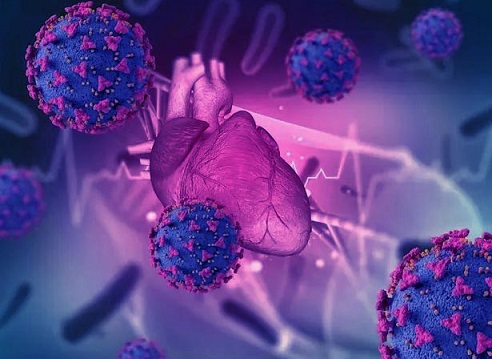Nikhil Prasad Fact checked by:Thailand Medical News Team Aug 03, 2024 8 months, 3 weeks, 2 days, 5 hours, 30 minutes ago
Medical News: The Heartbreaking Side of COVID-19
In a groundbreaking study, researchers have uncovered how different variants of SARS-CoV-2, the virus responsible for COVID-19, affect heart cells, known as cardiomyocytes, in both laboratory settings and living organisms. This
Medical News report delves into the fascinating findings from scientists at the University of Hong Kong, Chinese University of Hong Kong, and other esteemed institutions. Their research sheds light on the unique ways these variants infect and damage the heart, with potentially significant implications for understanding and treating COVID-19-related heart complications.
 New study reveals how COVID-19 variants differently impact heart cells
Key Findings: Variants and Their Impact on Heart Cells
New study reveals how COVID-19 variants differently impact heart cells
Key Findings: Variants and Their Impact on Heart Cells
The study focused on the effects of the Delta and Omicron variants of SARS-CoV-2 on cardiomyocytes. Using human-induced pluripotent stem cell-derived cardiomyocytes (hiPSC-CMs) in vitro and Golden Syrian hamsters in vivo, the researchers observed distinct patterns of infection and damage caused by these variants.
Omicron BA.2: A Surprising Culprit
One of the most startling discoveries was that Omicron BA.2, despite being generally perceived as causing milder respiratory disease, exhibited the highest efficiency in infecting and injuring cardiomyocytes both in vitro and in vivo. This variant induced significant changes in gene expression linked to increased cardiac dysfunction, outpacing the damage caused by other variants tested.
Thailand Medical News would like to emphasize that all the current variants such as the KP variants are all descendants of the JN.1 variant which in turn is a descendant of the BA.2.86 variant that originates from the BA.2 variants. Hence all these new variants currently in circulation are likely to share the same attributes of BA.2 if not better.
Mechanisms of Infection: How the Variants Differ
Viral Entry Pathways
Different SARS-CoV-2 variants utilize distinct mechanisms to enter and infect heart cells. While earlier variants such as Delta require the transmembrane serine protease 2 (TMPRSS2) for activation, Omicron variants can infect cells via endocytosis, a process that does not depend on TMPRSS2. This ability to bypass TMPRSS2, which is absent in cardiomyocytes, might explain the higher infectivity of Omicron BA.2 in these cells.
In-Depth Analysis: How Omicron BA.2 Affects Cardiomyocytes
The study's results revealed several key differences in how Omicron BA.2 impacts cardiomyocytes:
-Higher Infectivity and Severe Cellular Damage
Omicron BA.2 was shown to infect a significantly higher proportion of hiPSC-CMs compared to Delta and Omicron BA.1. The infected cells exhibited intense staining of the viral nucleocapsid protein (NP), indicating robust viral replication. This variant also caused pronounced cy
topathic damage, including severe mitochondrial dysfunction and structural alterations within the cells.
-Mitochondrial Dysfunction and Cell Death
The researchers found that Omicron BA.2 significantly suppressed mitochondrial redox potential, a critical measure of cellular metabolism, more than other variants. This suppression led to mitochondrial fragmentation and increased cell death, highlighting the variant's severe impact on cellular health.
In Vivo Observations: Hamster Models Reveal Severe Heart Damage
The study extended its findings to living organisms using Golden Syrian hamsters. Following infection, hamsters exposed to Omicron BA.2 exhibited notable myocardial damage, including congestion of blood vessels, interstitial edema, and immune cell infiltration in the heart. Necrotic changes in the myocardium were more frequent in hamsters infected with Omicron BA.2 than those infected with Delta, indicating more extensive tissue damage.
Molecular Insights: Gene Expression and Pathway Analysis
-Differential Gene Expression
The researchers conducted RNA sequencing to compare the global transcriptome of infected hiPSC-CMs. They identified thousands of differentially expressed genes (DEGs) unique to each variant. Omicron BA.2 induced significant downregulation of genes involved in mitochondrial function and energy production, consistent with the observed mitochondrial damage.
-Key Regulatory Networks
Bioinformatics analyses predicted that transcription factors such as SIX1, MEF2C, and TBX5 play crucial roles in regulating the unique gene expression profile induced by Omicron BA.2. These regulators are linked to critical cardiac functions, including contraction and calcium handling, and their dysregulation may underlie the severe cardiac effects observed with this variant.
Implications and Future Directions
Rethinking "Mild" Variants
The study's findings challenge the perception that Omicron variants cause only mild disease. While respiratory symptoms may be less severe, the ability of Omicron BA.2 to infect and damage heart cells underscores the need for vigilant monitoring of cardiovascular complications in COVID-19 patients.
Need for Further Research
The researchers emphasize the importance of continued investigation into the pathogenic mechanisms of different SARS-CoV-2 variants. Understanding how these variants affect the heart and other organs is crucial for developing targeted treatments and improving patient outcomes.
Conclusion: A Call for Awareness and Research
This study highlights the diverse ways in which SARS-CoV-2 variants can impact heart health, with Omicron BA.2 showing particularly concerning effects on cardiomyocytes. The findings underscore the need for heightened awareness of potential cardiac complications in COVID-19 patients and call for further research to unravel the complex interactions between the virus and the heart.
The study findings were published in the peer-reviewed journal: Cell & Bioscience.
https://link.springer.com/article/10.1186/s13578-024-01280-y
For the latest
COVID-19 News, keep on logging to Thailand
Medical News.
Read Also:
https://www.thailandmedical.news/news/covid-19-s-impact-on-aminothiols-and-heart-health-risks
https://www.thailandmedical.news/news/atrial-fibrillation-significantly-increases-mortality-risk-in-severe-covid-19-cases-
